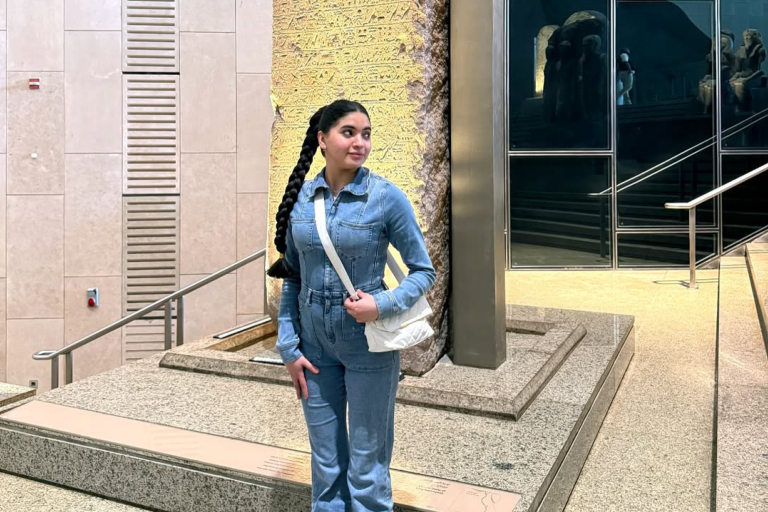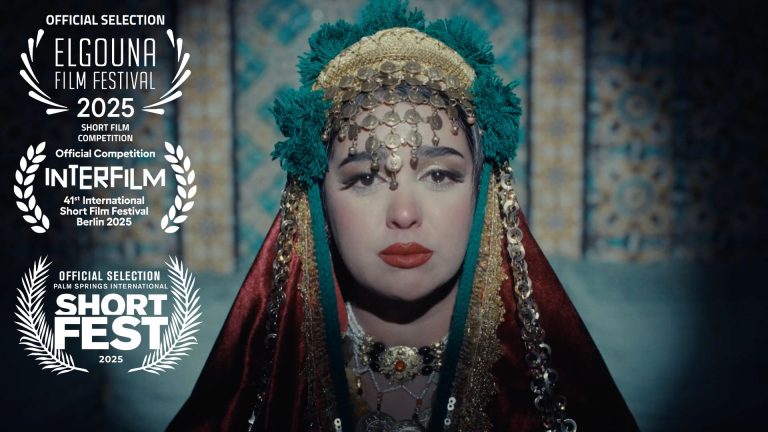Now in its third consecutive edition at El Gouna Film Festival, the special program Window on Palestine is a gateway held open, even when there’s wind, noise, and dust coming through. This program, dedicated to Palestinian cinema and its emerging voices, carried a particular weight this year. To frame a window in times like these is to suggest that cinema might still create a shared field between those who film and those who watch.
The films shown under this banner did not offer explanations or statements. They didn’t aim to update the world on Gaza or the politics of disappearance. Instead, they made the viewer confront something quieter and more durable: the material life of people who do not get to choose the time or geography they inhabit, yet continue to insist on making images and stories – gestures of ordinary life.
The program gathered different bodies of work that, together, traced the emotional and formal range of Palestinian cinema today. From Ground Zero, a series of short films developed by Rashid Masharawi with young directors working under siege in Gaza, shows women washing in the sea, children rehearsing a play, an adolescent shaving his head beside a tent.
Alongside it, Mahdi Fleifel’s A World Not Ours (2012) returned to the festival circuit more than a decade after its release, and yet it felt uncannily present. Set in the Ain Al Hilweh camp in Lebanon, Fleifel’s film moves through generations of men caught between memory and mobility, questioning what remains of home when exile becomes inheritance.

If From Ground Zero transforms survival into cinematic form, A World Not Ours turns nostalgia into critique. Between them runs a shared inquiry: how do people sustain the ordinary – family, humor, dignity – when the place itself becomes temporary? And how do femininity and masculinity, each in their own registers of strength and collapse, reconfigure under these conditions?
From Ground Zero: The Anatomy of Survival
When Rashid Masharawi first launched From Ground Zero in 2022, it began as a cinematic training project for young Gazan filmmakers. The initial wave included 22 shorts, documentaries, and animations, a collective effort to create images where images had all but disappeared. Two years later, Masharawi expanded the project with a new set of ten films, gathered under the title From Ground Zero+. Seven of these screened at El Gouna, marking the first time the new batch was shown.
The original release of From Ground Zero was scheduled for screening at Cannes Film Festival before being withdrawn for “political reasons.” That withdrawal was emblematic: even in a world saturated with images, some images are still considered too political simply because of who made them.
El Gouna – associated by some with red carpets and resort glamour – therefore became a site of resistance. By welcoming From Ground Zero, the festival engaged with regional realities rather than detach from them. The screening wasn’t a gesture of charity; it was an assertion that cinema, even under siege, still belongs in conversation with the world.

“Cinema isn’t about slogans; it’s about art that responds to reality,” Masharawi told us in El Gouna. “When Cannes decided to ignore what was happening, we said: fine, we’ll bring Gaza to Cannes ourselves.”
What began as a workshop in Gaza became a method of collective endurance. Masharawi and his small team mentored, trained, and supplied equipment to filmmakers who were often working without electricity or internet.
“All filming was done inside Gaza,” he explained. “Maybe three of the ten films had their first cuts edited there, but the final post-production was completed in France. Sometimes our team had to cross the Egyptian border just to upload footage. There were days with no contact at all, then suddenly, one day, we have connection, and we’d work nonstop, no sleep.”
These aren’t dispatches or reports. They are quiet assertions that life continues, even when every system conspires to stop it.
In Colors Under the Sky (Reema Mahmoud), a young woman who cannot record turns her phone into a diary. Hassan (Mohammed Alshareef) follows a trapped boy in the south of Gaza who shaves his head by the sea, as if cleansing himself of captivity. The Wish (Aws Al-Banna) documents a group of girls building a theater play in a camp classroom. In A Very Small Dream (Etimad Washah), women recount how the war stripped even the most private rituals from them: bathing, menstruating, kissing their children. “Before the war, I had freedom. I had privacy,” says Malak, bathing in salt water.
Masharawi calls it “a project of craft, not just testimony.”
“Being Palestinian, or a political prisoner, or a refugee – that alone doesn’t make you a filmmaker,” he said. “What makes you a filmmaker is craft. We want to tell the untold stories – not political debates, but human lives, people who dream and survive.”

In A Very Small Dream, femininity is framed as labor – the work of maintaining dignity when the body itself becomes a battleground. Across the series, there is no spectacle, no blood, no insistence on trauma. “The stories that touch people,” Masharawi said, “are the small, everyday details – like a mother who doesn’t kiss her children fearing disease.”
This aesthetic restraint, born of necessity, becomes the project’s signature.
From Ground Zero rewires our sense of what cinematic beauty looks like. It trades production value for intimacy, plot for proximity. The sea is a constant motif, both a confessional booth and a mirror. Children’s voices interrupt the drone of aircraft. Between pigeons and generators, a grammar of persistence emerges – built from fragments, tenderness, and repetition.
A World Not Ours: Masculinity and the Weight of Memory
Where Masharawi’s filmmakers film from within the siege, Mahdi Fleifel films from its echo. A World Not Ours (2012) begins in motion: planes crossing skies, border stamps, greetings recorded on VHS. Fleifel, born in Dubai and raised between Denmark and the Ain Al Hilweh refugee camp in Lebanon, turns this collage of movement into a study of male inheritance – the grandfather who never left, the friend who cannot, and the son who can’t quite return.
The film’s architecture is built from fragments: home videos, football broadcasts, TV jingles, and the dry humor of Fleifel’s own voice-over. Football becomes the emotional calendar of exile, every World Cup marking another round of deferred hope. What begins as affectionate observation deepens into something more ambivalent – the realization that nostalgia can harden into paralysis, and that masculinity inside the camp performs its own kind of captivity.

Abu Eyad, the friend and former Fatah militant, carries the film’s tragic arc. Charismatic and bitter, he personifies what happens when political struggle collapses into personal stagnation. The more Fleifel films him, the more his laughter becomes a kind of armor. It’s a portrait of masculinity stripped of momentum, caught between dignity and exhaustion, the inverse of the quiet, bodily strength found in Washah’s women from Gaza.
What makes A World Not Ours endure is its refusal of rhetoric. Fleifel’s humor, sometimes self-mocking, sometimes wry, never softens the pain, but it keeps it human. He’s acutely aware of his own privilege: the passport that lets him leave, the camera that turns memory into control. The film’s title, borrowed from Ghassan Kanafani, lands like an admission: belonging itself has become a moving target.
Between Survival and Creation
Taken together, From Ground Zero and A World Not Ours draw the coordinates of a single question: what happens to art, to gender, to intimacy, to authorship when the idea of home is temporary? One films from the wound outward, the other from the scar inward. Both turn constraint into method.
In Gaza, femininity is stripped of ornament and reduced to its essentials: the body as proof of survival. The violence is not only in bombardment but in the slow humiliation of scarcity, of having to negotiate menstruation, privacy, and hygiene.

Masculinity, on the other hand, turns introspective – its gestures of pride slowly collapsing into fatigue. Men like Abu Eyad in A World Not Ours inhabit another form of confinement – emotional rather than material, the paralysis of those who can leave in theory but nowhere leads home. His weariness mirrors the women’s scarcity; both are trapped in forms of containment, the lack of material means, the ambivalence of return.
The two modes circle each other: the private and the public, the fixed and the displaced, until what remains is simply human persistence refracted through film.
Masharawi told us, “We are a whole people, with colors, sounds, culture, and we are being targeted not only as lives but as an entire existence.” His words echoed Fleifel’s images: rooftops crowded with antennae, boys playing football in the dust, families sending taped greetings to relatives abroad. Both filmmakers understand that to document is not to fix, but to keep the conversation alive – to make the frame breathe.
To watch From Ground Zero and A World Not Ours together is to move between two temporalities of exile, one unfolding now, one preserved on tape, and to realize they speak the same language. What unites them isn’t despair but the refusal of invisibility.
The window in Window on Palestine doesn’t offer escape. It offers the insistence to keep looking. These films, whether born from rubble or from memory, remind us that cinema can still hold a fragment of what politics erases: laughter, ritual, touch, the daily negotiations of dignity.
The window stays open. Through it, the world looks back.














